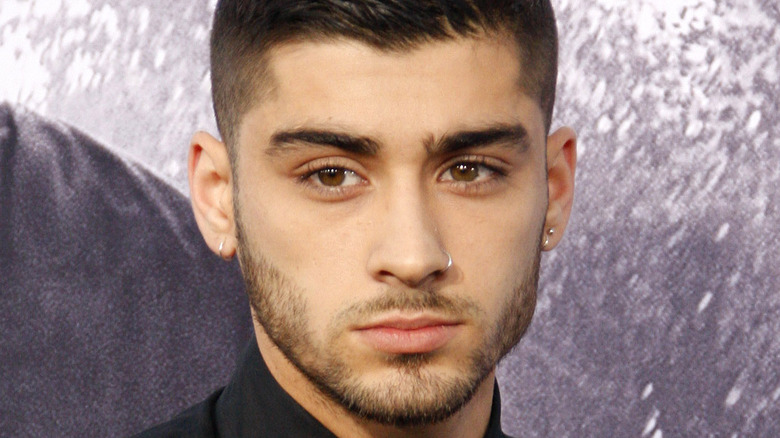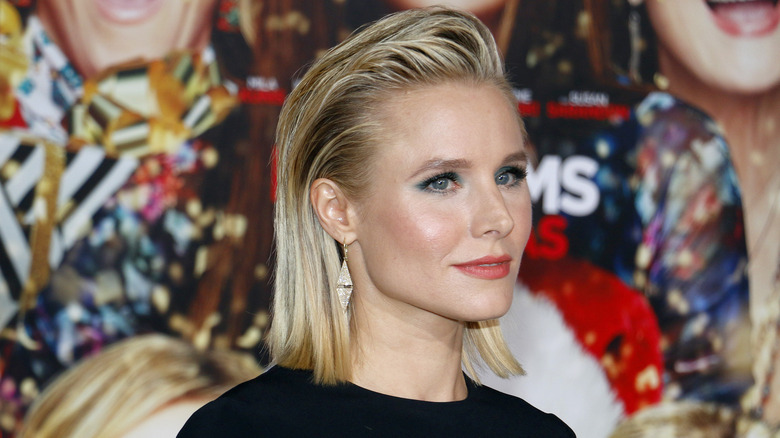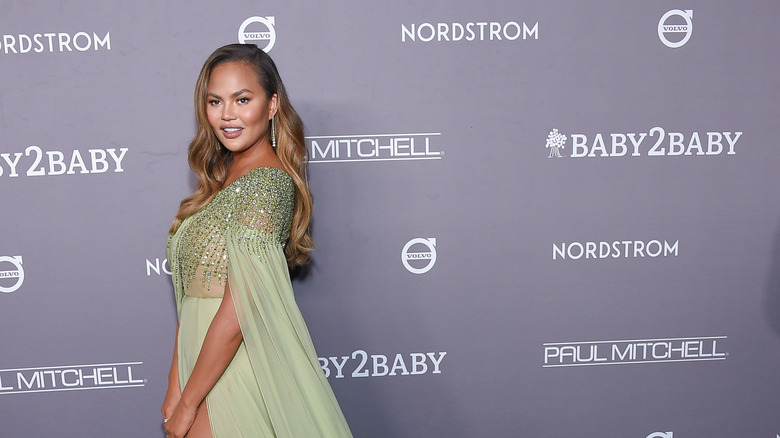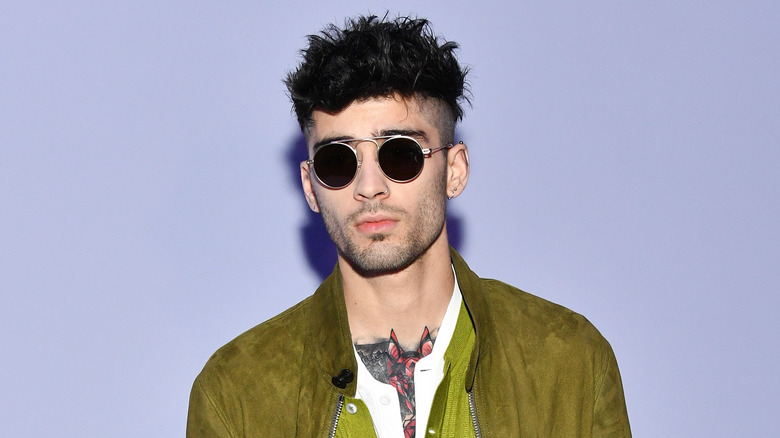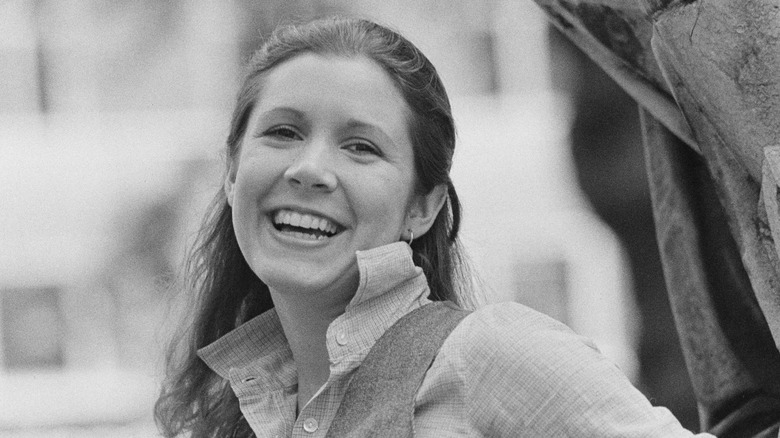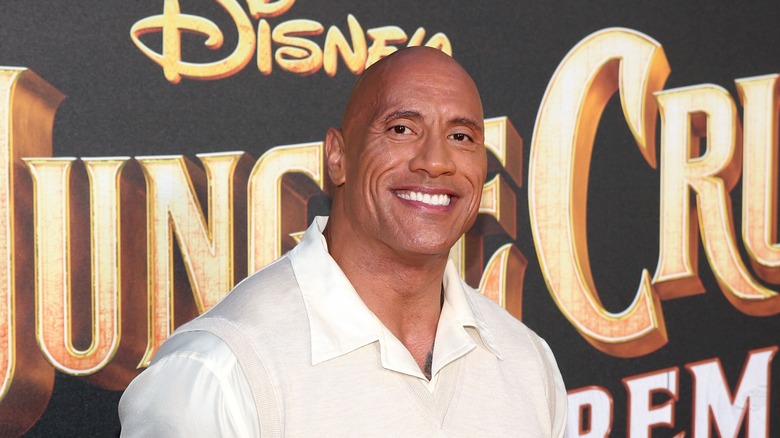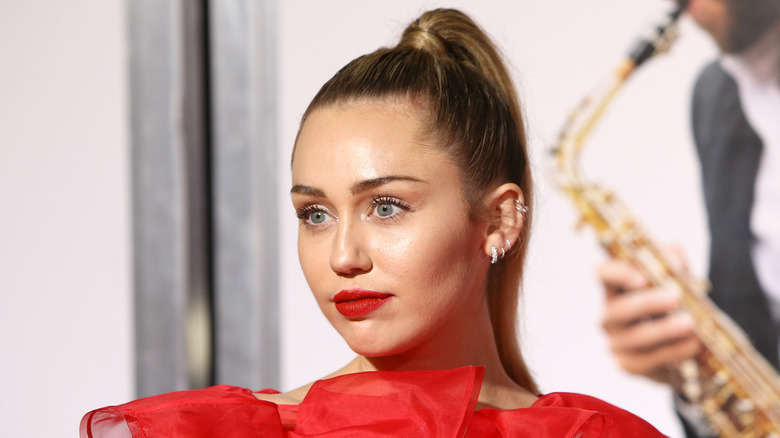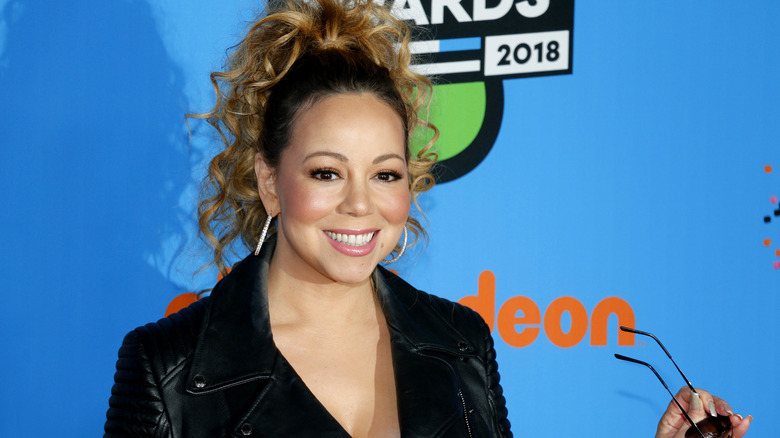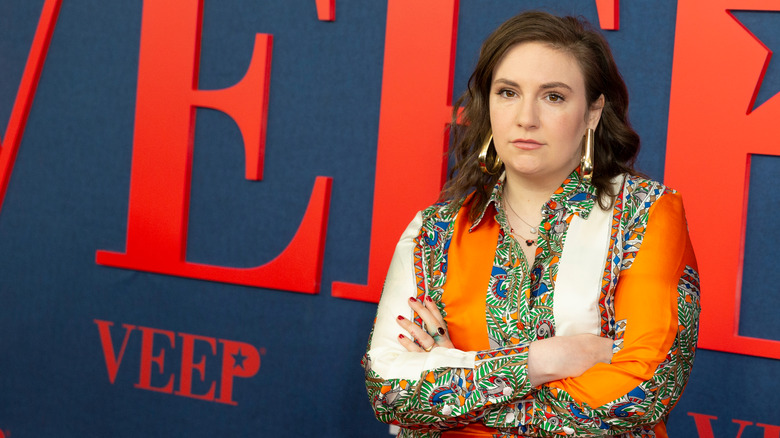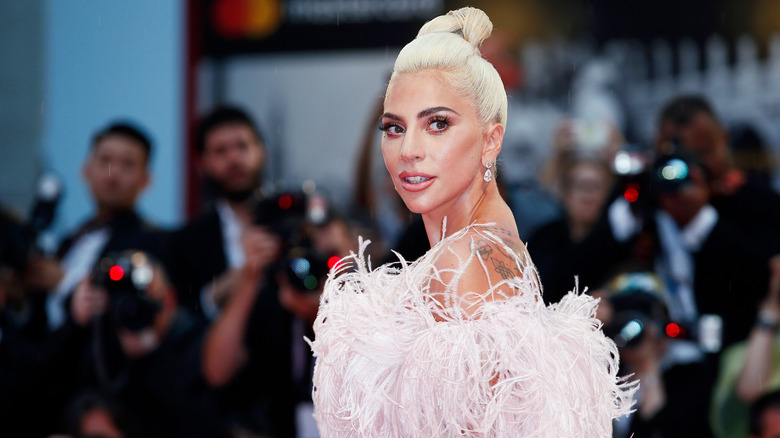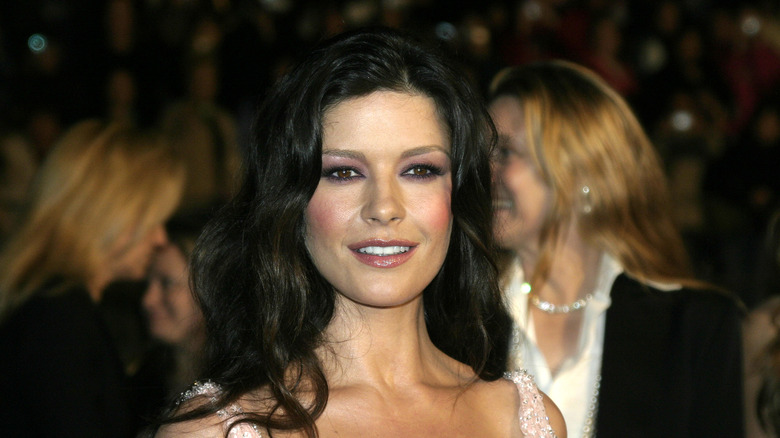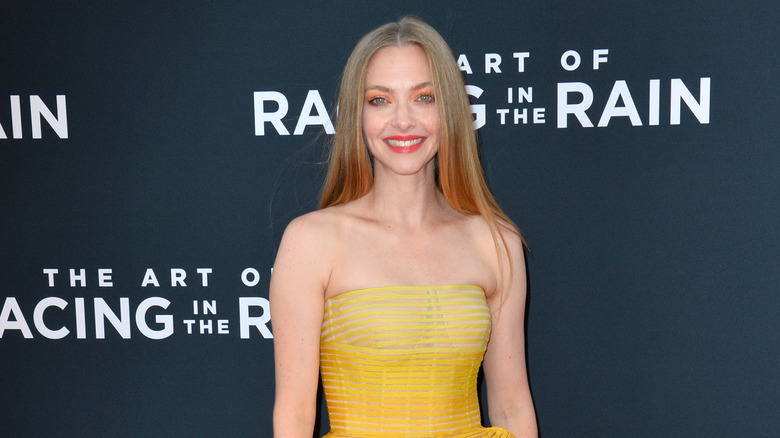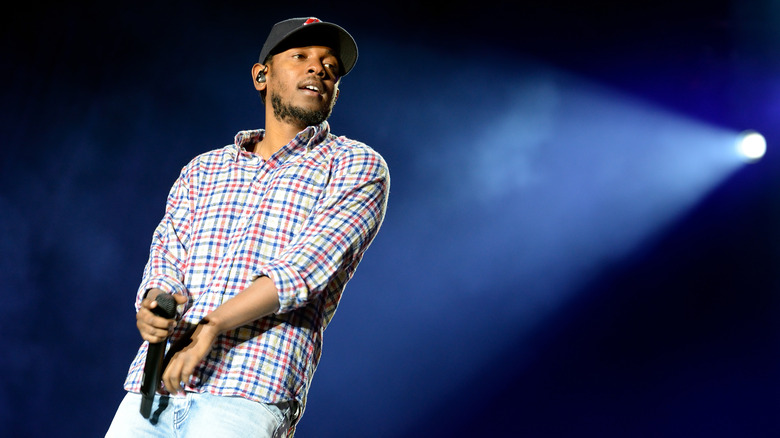Celebs Who Have Been Open About Living With Mental Health Conditions
Mental health is something that concerns all of us — yet talking about it isn't always easy, to put it mildly. For celebrities living with mental health conditions, they have the difficult choice of putting on a brave face for the cameras – trying to hide what's really going on in their mind — or being open about it, which can make them vulnerable to trolling and criticism. Neither option is ideal, but, for the following celebrities, being open about their mental health reality was the best option for them.
While nobody has a responsibility to reveal their mental health diagnosis, some people in the public eye have made the courageous decision to do just that — in the hopes of helping their fans feel less alone in the face of their mental health difficulties. In their own way, these stars are helping break the stigma and paint a more accurate picture of what it's really like to live with an invisible diagnosis.
Kristen Bell doesn't want her depression and anxiety to be taboo subjects
Kristen Bell is incredibly open about her experience with depression and anxiety. Describing her anxiety, she puts it like this: "It's hard to put into words, honestly, and it feels different at different times," Bell told Self. "When my anxiety is high, it feels like an absolute inability to make decisions. Like, I would rather not do something than decide what to do. And it's almost paralyzing." Bell has an equally visual explanation for her experience of depression: "Depression is different," she says. "My version of it feels very restricted, like... if you're trying to put on a latex glove that's way too small for your hand. Also, it sort of coincides with this feeling of not being excited about anything."
The actress goes on to explain that it's actually her husband, Dax Shepard, who encouraged her to speak publicly about her mental health – something she had previously kept private. In an interview with Off Camera with Sam Jones, Shepard confirmed this, explaining how he and Bell have allowed each other to grow as individuals. "Without me, she's never on your show admitting she has depression," Shepard said. "She's never doing that. That's like something she got from me."
With her husband's help, Bell has become an outspoken advocate for mental health over the years. "Mental health check-ins should be as routine as going to the doctor or the dentist," she told Time in 2016.
Camila Cabello was scared to seek help for OCD and anxiety
Camila Cabello knows all too well how different people's lives can look on Instagram compared to their actual reality. In 2020, the singer (and now actress) got vulnerable in an essay for WSJ Magazine, explaining that, even though her Instagram pictures made her look like she was doing great, her mental health painted a different picture. "Here's what there aren't pictures of from the last year: me crying in the car talking to my mom about how much anxiety and how many symptoms of OCD I was experiencing," she wrote. "Me experiencing what felt like constant, unwavering, relentless anxiety that made day-to-day life painfully hard."
Cabello admitted that she felt shame about her struggles, and that it took a long time for her to be able to share those with the world. "In order to heal it, I had to talk about it," she said. Since then, she has used a combination of techniques, including therapy and a mindfulness practice, to manage her symptoms, and she feels a lot better. On her journey, Cabello has learned to take care of herself. Posting on Instagram in 2021, she wrote, "I started seeing how after resting during that period, cultivating new hobbies, prioritizing my mental health, my friendships and relationships, making time for exercise, and also enjoying being lazy again, I started to naturally feel inspired, passionate, and way more creative."
Chrissy Teigen struggled with postpartum depression and anxiety
Despite its prevalence in society, postpartum depression is not talked about nearly enough. According to the CDC, "About 1 in 8 women experience symptoms of postpartum depression." Chrissy Teigen, for one, kept her postpartum depression private for a while because of a sense of confusion she felt, but she ultimately made the decision to open up about it in an essay for Glamour in 2017.
Teigen writes that she struggled considerably with depression and anxiety after the birth of her daughter, Luna, in 2016. She tells the story of finally going to see a doctor about it: "I looked at my doctor, and my eyes welled up because I was so tired of being in pain," she writes. "Of sleeping on the couch. Of waking up throughout the night. Of throwing up. Of taking things out on the wrong people. Of not enjoying life. Of not seeing my friends. Of not having the energy to take my baby for a stroll."
The model and author addressed her mental health difficulties again in 2020 in an interview with British Glamour. "It was a sad existence," she told the magazine. "There were no highs. It was a flatline of life for a few months." Teigen also explained the painful paradox of having experienced fertility issues, only to give birth and experience such horrible depression. Because she experienced this with Luna, Teigen thankfully found giving birth to her son, Miles, in 2018 a lot easier.
Zayn Malik has struggled with anxiety and an eating disorder
Zayn Malik saddened fans when he made the difficult decision to leave One Direction in 2015, but he did it for his own well-being. Writing in his autobiography (via The Sun), Malik revealed that he had been seriously unwell in his final months with the band, in late 2014. "Something I've never talked about in public before, but which I have come to terms with since leaving the band, is that I was suffering from an eating disorder," the artist wrote. "I think it was about control. I didn't feel like I had control over anything else in my life, but food was something I could control, so I did."
Malik has also been very candid about his struggle with anxiety over the years. "Anxiety is nothing to be ashamed of; it affects millions of people every day," he wrote in an excerpt of his autobiography, published in Time, to explain why he couldn't go through with solo performances. "I know I have fans out there who have been through this kind of thing, too, and I wanted to be honest for their sake, if nothing else." He explained that, even though he experienced anxiety while touring with One Direction, the band still felt like a "safety net," whereas the idea of having to perform alone felt a lot more daunting. He found it really "upsetting" to have to cancel, but said he had to prioritize his mental health.
Carrie Fisher discovered she had bipolar disorder at 24
Just months before her tragic death in December of 2016, Carrie Fisher started an advice column for The Guardian. Through this column, she was open about her own mental health while helping readers navigate theirs. Fisher famously suffered from bipolar disorder, having been diagnosed at 24. One person with the same diagnosis wrote in, "Have you found a way to feel at peace when even your brain seesaws constantly?"
Fisher's answer was beautiful. "We have been given a challenging illness, and there is no other option than to meet those challenges," she wrote. "Think of it as an opportunity to be heroic — not 'I survived living in Mosul during an attack' heroic, but an emotional survival. An opportunity to be a good example to others who might share our disorder."
After her death, Fisher was branded a "mental health hero" by USA Today. Throughout her life, she took on commitments that few other celebrities would agree to, like a cover shoot for a new magazine about bipolar disorder. "Carrie Fisher on the cover got us advertising we never would have gotten otherwise," the magazine's founder told USA Today. "I don't know what we would have done without her."
Her bravery didn't make Fisher's experience with bipolar disorder any less painful. "You can't stop," she once told Diane Sawyer. "It's very painful. It's raw. You know, it's rough ... when you're not busy talking and trying to drown it out."
Dwayne The Rock Johnson has dealt with depression more than once
Dwayne "The Rock" Johnson has endured some difficult times. "I've battled that beast more than once," Johnson once said, referring to episodes of depression. Years ago, he witnessed his mother's suicide attempt and became too injured to play football professionally, so when a girlfriend ended it with him, on top of that, it was just too much to bear. "That was my absolute worst time," he told Express.
That interview got people talking, and The Rock was moved by the conversations it started. "It was really overwhelming and thousands of people responded," he told BBC News. "It all started when I helped a man [a fan who was fighting his own battle with depression]. I said, 'Hey, you're not alone, we all go through it.' One of the most important things that I know helped me with the multiple times that I had gone through my own episodes of depression, was making sure that I was talking to people."
Addressing his comments on Twitter, he wrote, "Depression never discriminates." His hope was that his followers would follow his example and talk about their own struggles. "Took me a long time to realize it but the key is to not be afraid to open up," he continued. "Especially us dudes have a tendency to keep it in. You're not alone." Johnson continues to speak up about mental health, for example, as part of an episode of "Young Rock" (via Yahoo!).
Miley Cyrus has been open about her history with depression
Miley Cyrus is known for sharing much of her personal life — good and bad — with fans. One of her more difficult experiences has been living with depression, which she spoke about in a 2014 cover story for Elle. "I went through a time where I was really depressed," she told the magazine. "Like, I locked myself in my room and my dad had to break my door down."
Cyrus went on to explain that fame is a double-edged sword when it comes to opening up about mental health, because, on the one hand, it gives her a platform to help others, but, on the other, people might see her as "being ungrateful" for the privileges she has. "There's not much that I'm closed off about, and the universe gave me all that so I could help people feel like they don't have to be something they're not or feel like they have to fake happy," she said. "There's nothing worse than being fake happy."
The singer and actress has also never hidden the fact that she has, at times, turned to alcohol and drugs, but told Variety in June 2020 that she was "sober sober" and had sought professional help. "By understanding the past, we understand the present and the future much more clearly," she said. "I think therapy is great," though Cyrus later told Rolling Stone that she briefly "fell off" the sobriety wagon during the pandemic.
Mariah Carey pursued treatment for bipolar disorder
Mariah Carey spoke about her bipolar disorder diagnosis in an interview with People in 2018, after years of keeping it private. "Until recently I lived in denial and isolation and in constant fear someone would expose me," she said. "It was too heavy a burden to carry and I simply couldn't do that anymore. I sought and received treatment, I put positive people around me and I got back to doing what I love — writing songs and making music." She told the magazine she was pursuing therapy and taking medication to help her manage her mental health.
Carey told People that she was diagnosed in 2001, which is when news of her struggles with mental health first broke. At the time, she had to cancel a series of shows and go to the hospital. "She has suffered an emotional and physical breakdown ... she is under psychiatric care," a spokesperson for the singer told the Associated Press at the time (via Billboard). "She did break some dishes and glasses, and she may have stepped on them," the spokesperson added, in explaining why Carey had sustained injuries.
Writing for BuzzFeed News, journalist Alessa Dominguez pointed out that when Carey was first diagnosed, the public's opinion of mental ill health was a far cry from what it's like today. And so it makes sense that she didn't feel comfortable speaking out about it at the time: Her words would likely have been twisted, or dismissed.
Lena Dunham speaks publicly about her anxiety and OCD
Lena Dunham has used her platform to help others struggling with their mental health, notably by collaborating with mental health charity Child Mind Institute. "I'm a writer, director, an actor and I have obsessive compulsive disorder and a generalized anxiety disorder that often leads to dissociative anxiety," she told People in 2017. "I would tell my younger self that there's no shame in asking a teacher for help, telling a friend that you're uncomfortable and that it's just the same as falling down and scraping your knee."
In 2013, Dunham used her experience with OCD to portray it more accurately than other mainstream representations of it on her show "Girls" — in which her character, Hannah, suffers from the condition. "It's something that I've struggled with so I feel as though I am able to shed a certain kind of light on the experience and do something that doesn't necessarily feel cookie cutter," Dunham said in an interview (via Child Mind Institute). She also addressed the storyline on Twitter after it was first introduced: "Really grateful for all your beautiful reactions to the OCD on tonight's girls," she wrote.
Mental health is an issue of high importance for Lady Gaga
Before Lady Gaga started working on her 2020 album "Chromatica," she experienced a dark period. "I used to wake up in the morning, and I would realize I was 'Lady Gaga,'" she told People. "And then I became very depressed and sad, and I didn't want to be myself. I felt threatened by the things my career brought into my life and the pace of my life." She didn't feel well for a while, but eventually her "catatonic state" lifted. "And then I finally, slowly started to make music and tell my story through my record," she said.
Mental health is an important issue to Lady Gaga, who has previously partnered with mental health initiatives, including Mental Health First Aid and Mental Health America — not to mention her own Born This Way Foundation, which also aims to improve mental well-being. In 2018, she co-wrote an essay for The Guardian, in which she called for people to be more open about their mental health and for support services to be considerably improved to prevent disastrous outcomes. "Instead of treating those facing mental health conditions with the compassion we would offer to someone with a physical injury or illness, we ostracize, blame, and condemn," Gaga wrote alongside Dr. Tedros Adhanom Ghebreyesus of the World Health Organization. "In too many places support services are non-existent and those with treatable conditions are criminalized ... cut off from the rest of society without hope."
Taylor Swift revealed her struggles with an eating disorder in 'Miss Americana'
Taylor Swift is often viewed as one of America's sweethearts, but the singer has had a difficult price to pay for her public image — including the plethora of nasty comments she has received over the years. In the Netflix documentary "Miss Americana," Swift spoke about her experience with an eating disorder. "I tend to get triggered by something, whether it's a picture of me where I feel... like I looked like my tummy was too big or, like, someone said that I looked pregnant or something, and that'll just trigger me to just... starve a little bit, just stop eating," she said. She explained that, since she started eating more, things had improved for her.
She later spoke with Variety about the decision to share this difficult experience with the world. "All I know is my own experience," she told the outlet. "And my relationship with food was exactly the same psychology that I applied to everything else in my life: If I was given a pat on the head, I registered that as good. If I was given a punishment, I registered that as bad." Swift has always tried to toe the line between her public and private lives, but it hasn't always been smooth-sailing: Although she often appears smiley and happy, she has also admitted to sometimes feeling "really, really low."
Catherine Zeta-Jones has courageously spoken out about her bipolar disorder
In 2011, actress Catherine Zeta-Jones announced via a publicist that she had checked into a psychiatric hospital for several days, and representatives from mental health organizations highly praised her decision at the time. "[Zeta-Jones' announcement] will have a huge impact on [people] recognizing mental illness is a condition that everyone can suffer from," Marjorie Wallace, representing Sane, told The Guardian. "The importance is for people to accept it's a treatable illness rather than live with it for years so that they become more and more sucked into a downward spiral and at risk of suicide."
Speaking to Good Housekeeping in 2016, Zeta-Jones explained that figuring out what was happening with her mental health, being able to label it, "was very liberating." She also detailed what it's like to experience bipolar symptoms. "There are amazing highs and very low lows," she told the magazine. "My goal is to be consistently in the middle. I'm in a very good place right now. A lot of that is to do with the fact that I'm much more knowledgeable about what I call my pain in the a**!"
Amanda Seyfried wanted to be honest about her experience with anxiety
As a young actress, Amanda Seyfried felt very anxious but didn't know where to turn. After experiencing a panic attack, she was able to get the help she needed at last — and she wanted it to be known far and wide. "At first, my publicist said, 'Don't talk about your anxiety,'" Seyfried told Net-A-Porter in 2018. "And I thought, f**k you, actually. I want kids who are having weird thoughts to share them without stigma. And if that affects my career, so be it."
Seyfried also suffers from OCD, which manifests in different ways, including a fear of forgetting to turn off the stove, or in the form of health anxiety, as she told Allure in 2016. She takes the antidepressant Lexapro to help her manage day-to-day life. She explained that she doesn't intend to stop taking it because it helps her, and the only reason she would stop taking it would be because of the "stigma" associated with it. "A mental illness is a thing that people cast in a different category [from other illnesses], but I don't think it is," she said. "It should be taken as seriously as anything else. You don't see the mental illness: It's not a mass; it's not a cyst. But it's there. Why do you need to prove it? If you can treat it, you treat it."
Kendrick Lamar has written lyrics about depression and suicidal thoughts
Several lyrics in Kendrick Lamar's song "u" address a state of depression. "I know depression is restin' on your heart for two reasons," he sings. "And if I told your secrets the world'll know money can't stop a suicidal weakness." In an interview with MTV in 2015, Lamar was directly asked whether these lyrics were based on his own experience. "I've pulled that song not only from previous experiences, but I think my whole life," he answered. "I think everything is drawn out of that ... Nothing was as vulnerable as that record."
Lamar explained that he really wanted to share those experiences with his listeners because he wanted his music to have a "positive" influence on them. One BBC News article seems to confirm that he achieved his goal: In this piece, a young Londoner named Vital Luke explained how helpful it had been for him to see some of his favorite artists — including Kendrick Lamar, Kid Cudi, and Stormzy — be open about their mental health, thereby validating his own experience. "There was a lot of backlash when he [Kendrick Lamar] spoke about depression because hip-hop is such an aggressive art," Luke said. "So for him to talk about that subject was big and helped a lot of people of my age." We hope Lamar has been able to directly witness the incredible impact he's had.

